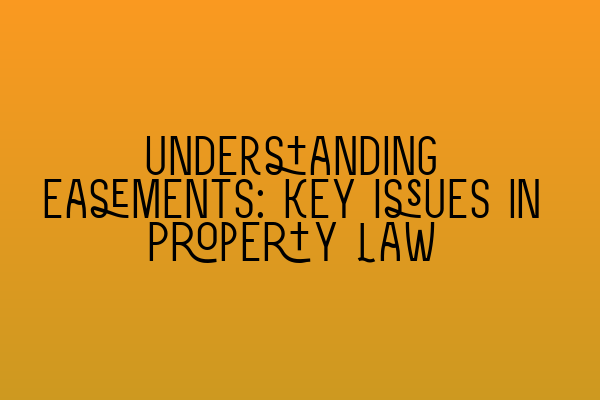Understanding Easements: Key Issues in Property Law
When dealing with property law, one concept that often arises is the notion of an easement. Easements can have a significant impact on property rights and usage, so it is crucial to understand their nature and implications. In this article, we will explore the key issues related to easements in property law.
What is an Easement?
An easement is a legal right that allows someone (known as the beneficiary or dominant owner) to use or access another person’s property (known as the servient tenement) for a specific purpose. This purpose may include rights of way, parking, drainage, or any other agreed-upon use.
It is important to note that an easement does not grant ownership or possession of the property. Instead, it grants a particular right to use or access the property. Easements are typically attached to the land and can last indefinitely.
Creation of Easements
Easements can be created in several ways, and it is essential to understand the methods of their creation to effectively handle property law matters.
Express Grant
An easement can be expressly granted by the owner of the servient tenement. This grant is usually formalized through a written agreement, such as a contract or a deed. The agreement should clearly outline the rights and limitations associated with the easement.
When creating an easement through an express grant, it is crucial to ensure that the agreement is properly drafted and executed. Hiring a qualified property law solicitor, like the experts at SQE Property Law & Land Law, can help you navigate the complexities of the legal process and ensure the validity and enforceability of the easement.
Implied Easements
Easements can also be implied in certain circumstances, even if they are not explicitly granted. Implied easements are typically created when there is a long-standing and obvious use of one property benefiting another property.
For example, if a landlocked property has been using a neighboring property’s driveway for access for a significant period, an implied easement may arise. These easements are rooted in principles of fairness and necessity to maintain the reasonable use and enjoyment of a property.
Easements by Prescription
Easements by prescription, also known as easements by prescription, are created when the beneficiary has continuously and openly used another person’s property for a specific period, typically 20 years. This usage must be without the owner’s permission and must satisfy certain legal criteria.
It is important to consult with a property law solicitor to determine the requirements for establishing an easement by prescription. They can guide you through the legal process and ensure that all necessary elements are met.
Types of Easements
Easements can come in various forms, depending on the nature of the right being granted. Here are some common types of easements:
Right of Way
A right of way easement allows the beneficiary to pass through the servient tenement to access their property. This is often necessary when a property is landlocked or when access is limited due to physical barriers.
Understanding the rights and limitations associated with a right of way easement is crucial to avoid potential conflicts with the owner of the servient tenement. Consulting with a property law solicitor can provide the necessary insights and guidance.
Drainage and Sewer Easements
Drainage and sewer easements grant the beneficiary the right to use the servient tenement’s land for drainage or sewerage purposes. These easements are essential to ensure proper water management and sewage systems within a given area.
If you are dealing with easements related to drainage and sewerage, it is advisable to seek professional assistance from experienced property law solicitors. They can help you navigate any legal complexities and ensure compliance with local regulations and requirements.
Utility Easements
Utility easements allow utility providers, such as electricity, gas, or telecommunications companies, to lay and maintain their respective infrastructure on the servient tenement’s land. These easements often involve the installation of power lines, pipes, or cables.
When dealing with utility easements, it is crucial to have a clear understanding of the rights and responsibilities of both the beneficiary and the servient tenement owner. Consulting with a property law solicitor can help ensure that the terms of the easement are fair and reasonable.
Resolving Easement Disputes
While easements are intended to provide clarity and ensure the peaceful coexistence of properties, conflicts and disputes may still arise. Resolving easement disputes requires a thorough understanding of property law and a strategic approach.
If you find yourself involved in an easement dispute, it is advisable to seek the assistance of a property law solicitor with experience in handling such cases. They can evaluate the situation, consider relevant legal precedents, negotiate with the other party, and represent your interests in court if necessary.
At SQE Property Law & Land Law, we have a team of professional solicitors who specialize in property law. Whether you need assistance with creating easements, resolving easement disputes, or any other property law matter, we are here to help. Contact us for expert advice and guidance.
Related Articles:
SQE 1 Practice Exam Questions
SQE 1 Practice Mocks FLK1 FLK2
SQE 2 Preparation Courses
SQE 1 Preparation Courses
SRA SQE Exam Dates
